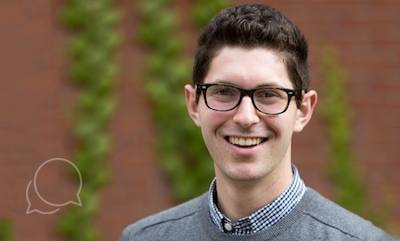‘It’s Been Rewarding to Partner with My Alma Mater’.
Breakfast: “If I’m not up early walking my dog, Brooklyn, or scheduling calls with the CAMTech India and Uganda teams, you can usually find me listening to NPR Morning Edition and eating leftover shakshuka!” Hometown: Detroit, Michigan Extracurriculars: Reading, listening to music, running on the Esplanade, watching “RuPaul’s Drag Race,” and seeing Oscar favorites at the movies.
Nicholas Diamond (SPH ‘17) Marketing and Communications Manager for the Consortium for Affordable Medical Technologies (CAMTech) at Massachusetts General Hospital Global Health
What is the CAMTech Gun Violence Prevention Summit & Hack-a-thon, and how has SPH gotten involved? What are you looking forward to the most?
During the Gun Violence Prevention Challenge Summit & Hack-a-thon (April 13-15), the Consortium for Affordable Medical Technologies (CAMTech) will employ a public health approach to gun violence prevention by generating innovations that can address gun safety, mental health, community resilience, and policy. CAMTech will award a Community Resilience Award ($1,000), a Tech Innovation Award ($1,000), a Communications Strategy Award ($1,000) and a $10,000 Post-Hack-a-thon Award.
The Challenge Summit will convene clinicians, government representatives, public health experts, and affected community members to facilitate a discussion of challenges and provide critical insight into gun violence prevention. The Hack-a-thon will serve as an open-innovation platform for a diverse community to co-create innovations over a 48-hour period. Through cross-disciplinary collaboration, mentorship, and award incentives, teams can accelerate ideas into breakthrough innovations with the potential to curb the epidemic of gun violence and improve the lives of survivors.
Through its “co-creation” model, CAMTech will convene experts in health, engineering and business to increase awareness and generate solutions to improve gun violence prevention. Innovators will develop technologies that are not only user-centric, technologically disruptive, and socially impactful, but also commercially viable. Working together, there is the power to effect real change and save lives.
As an SPH alum, it’s been rewarding to partner with my alma mater to move the needle on gun violence prevention. Dean Sandro Galea, Michael Siegel, the Activist Lab, and Public Health Post have all contributed in their own ways to help make both the Gun Violence Prevention Challenge Summit and the Hack-a-thon a tool to effect change in gun violence and improve the public’s health.
Gun violence is often talked about in public health with hard data and statistics. We’ve had a series of events around campus over the last year to shift that narrative towards storytelling. How do you think the Summit and Hack-a-thon will impact the narrative of gun violence in Boston and/or in America?
CAMTech strives to not only present quantitative data of gun violence during the Challenge Summit & Hack-a-thon, but also qualitative data. We structured the Challenge Summit to present four panels addressing self-inflicted gun violence, accidental shootings, gun assaults, and mass shootings. In addition to continuing the conversation using panel presentations, we also scheduled four survivors of gun violence to share their personal stories: Joseph Sakran of Johns Hopkins University, Martin Henson of Black Lives Matter – Boston, Jody Marchand of Moms Demand Action for Gun Sense in America, and Joshua McGill, who survived the mass shooting at the Orlando Pulse Nightclub.
How did your time at SPH influence your career path? How have you applied the skills you acquired here to the hackathon?
As a student at SPH, I quickly learned how our alumni are not only thinking and teaching public health, but also doing it. James Wolff in the Department of Global Health knew about my interests in health communications and shared the CAMTech opportunity with me, and he also introduced me to Sandra Butler (SPH’11), CAMTech’s senior manager for global business strategy. Sandra and I work closely together and have been so thankful to engage SPH in the Gun Violence Prevention Challenge Summit & Hack-a-thon.
What were your particular research interests were while here/at Public Health Post? Do you still have those same interests? How do they fit into your career?
Within global health, I focused on sex, sexuality, and gender. My research primarily looked at HIV and LGBT health in francophone Africa, but I also became interested in using communications as a tool to improve population health. Training with Melissa Davenport and David Jones at Public Health Post also gave me the opportunity to develop my health communications skills and prepared me for my role as the Marketing & Communications Manager at CAMTech.
You can register to volunteer with the Activist Lab at the the summit and hackathon.